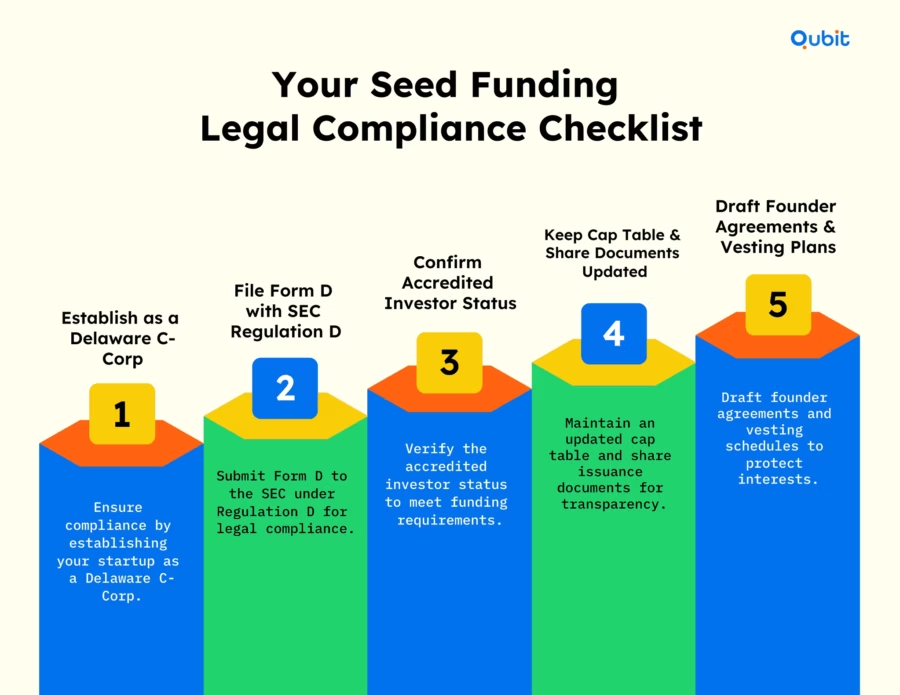Securing seed funding is a pivotal milestone for any startup, but it comes with its own set of legal complexities. Without a solid legal foundation, startups risk jeopardizing investor trust and long-term growth. This blog aims to provide a comprehensive guide to the legal essentials that safeguard your business during the seed funding process.
Knowing how to get seed funding involves not only crafting a compelling pitch but also understanding the legal requirements to ensure compliance and protect your startup’s future. From deal structures to compliance frameworks, we’ll cover actionable insights to help you navigate this critical stage. Let’s jump right in!
How to Choose the Right Legal Structures & Terms for Seed
Knowing what seed funding entails is the first step toward understanding the key legal considerations needed to secure and protect early-stage capital. Then you must choose the right structure.
Selecting the right legal framework isn't just paperwork—it can shape your entire funding journey. From how you negotiate equity to how quickly you close a round, these decisions have ripple effects. Here’s what founders should keep in mind:
- Know your financing options
Common structures include SAFEs, convertible notes, priced equity rounds, and founder loans. Each comes with trade-offs in flexibility, speed, and long-term equity implications. - Leverage convertible instruments for early-stage flexibility
SAFEs and convertible notes help delay valuation debates, making them well-suited for pre-revenue startups that want quicker funding without extensive negotiation. - Understand valuation terms
Pre-money vs. post-money valuations directly affect ownership distribution. Founders need to calculate these figures carefully to avoid giving away more equity than intended. - Ensure legal compliance from day one
IP protection, investor rights, and compliance frameworks all help protect your startup’s interests and attract serious investors. - Use vesting schedules to maintain team alignment
Vesting prevents early equity exits, keeping founders and key hires committed over time. - Learn from real-world scenarios
Startups using SAFEs often close faster rounds. Those with solid vesting schedules avoid co-founder disputes and build more stable teams.
Knowing the types of startup funding helps you pinpoint the best options for your business, including the legal considerations during seed funding rounds. By addressing these core legal issues, founders can position their startups for sustainable growth while minimizing risks associated with early-stage funding.
Critical Legal Requirements for Seed Financings
Before chasing investors, startups need their legal house in order. Compliance isn’t just a formality—it protects the company and reassures backers that you're serious. Here's what that looks like in practice:

- Start with the right incorporation
Delaware is the go-to choice for many startups thanks to its investor-friendly laws and predictable legal system. It signals credibility and simplifies future fundraising. - Understand Regulation D requirements
Most seed rounds fall under this exemption, which allows private fundraising without going public. You’ll need to file Form D with the SEC and stay within specific disclosure guidelines. - Verify investor accreditation
Only accredited investors qualify under Regulation D. That means documenting income or net worth requirements and keeping clear records to avoid legal trouble later. - Stay on top of documentation
From offering terms to compliance filings, having accurate, up-to-date paperwork reduces risk and builds trust during due diligence.
Before diving into legal agreements, understanding the differences between seed funding vs angel investment can help clarify the type of investor relationships to prioritize.
With seed investments projected to reach $10.1 billion by January 2025, regulatory scrutiny is expected to tighten. Companies must remain vigilant in meeting compliance standards to secure funding successfully.
The Foundation of Seed Funding
Seed funding represents the critical first step in transforming a promising idea into a tangible business. Often referred to as a "seed round," this initial investment is designed to help startups develop a prototype and achieve early market traction. By securing seed capital, entrepreneurs can focus on proving the viability of their concept, which is essential for attracting larger investments in subsequent funding rounds.
Unlike pre-seed funding, which typically supports foundational efforts like team building and legal readiness, seed funding enables startups to refine their product and validate market demand. Thought for a few seconds. Legal essentials often begin at pre seed funding, where foundational agreements set the tone for future rounds of capital acquisition.
Seed funding is not just about financial support; it’s about creating momentum. With the resources provided, startups can test their ideas in real-world scenarios, gather user feedback, and demonstrate growth potential. This process builds investor confidence, paving the way for larger funding rounds and long-term success.
Mastering the Legal Framework for Seed Funding Success
Securing seed funding requires more than just a compelling pitch; it demands a solid legal foundation to protect both founders and investors. Understanding the seed funding definition is crucial, as it sets the stage for navigating the essential legal documents and compliance measures that ensure a successful funding round.
Key Legal Documents for Seed Funding
- Term Sheets
Term sheets outline the fundamental terms and conditions of the investment, including valuation, investor rights, and equity distribution. This document serves as the blueprint for negotiations, ensuring clarity and alignment between parties. - SAFE Agreements and Convertible Notes
Simple Agreement for Future Equity (SAFE) and convertible notes are popular instruments for early-stage funding. They allow startups to defer valuation discussions while securing capital, making them attractive options for both founders and investors. - Subscription Agreements
Subscription agreements formalize the investor’s commitment to purchase shares in the company. These documents are critical for maintaining transparency and ensuring legal compliance during the transaction process.
Compliance Measures to Protect Your Funding Round
Adhering to regulatory requirements is non-negotiable. Filing Form D with the SEC is mandatory for startups raising funds under Regulation D exemptions. Additionally, maintaining corporate formalities—such as accurate record-keeping and shareholder agreements—helps safeguard the company’s legal standing and instills investor confidence.
Intellectual Property Protection
Early-stage intellectual property (IP) protection is vital for long-term value creation. Investors often evaluate a startup’s IP portfolio to assess its competitive edge. Securing trademarks, patents, and copyrights early can significantly enhance your company’s attractiveness during funding rounds.
Building the Right Structural Foundation for Seed Funding
Choosing the right business structure is a critical step for startups aiming to secure seed funding. Forming a Delaware C-Corp is often recommended due to its straightforward legal framework and the confidence it inspires in investors. This entity type simplifies equity allocation, ensures compliance with regulations, and provides a scalable foundation for future rounds of funding.
Equally important is drafting comprehensive founder agreements. These documents establish clear equity distribution among founders and safeguard individual interests. Transparent agreements reduce the risk of disputes and provide clarity on roles, responsibilities, and ownership stakes. Addressing these structural elements early can prevent costly mistakes that may arise later.
Building a solid foundation sets the stage for success in what is a seed round and beyond. Allocating seed money for startups effectively ensures that initial capital is used to establish a strong legal and operational framework, further enhancing investor confidence.
Negotiating Investment Terms Effectively
Securing seed funding requires a balanced approach to investment terms that safeguards founder equity while attracting investors. A realistic valuation, grounded in market comparables and the potential of your team, sets the stage for productive negotiations. Overestimating your startup’s worth can deter investors, while undervaluing it risks losing control in future rounds.
Critical investor provisions, such as anti-dilution clauses, voting rights, and liquidation preferences, demand close attention. These terms can significantly impact founder control and equity retention. For example, anti-dilution clauses protect investors during down rounds but may dilute founder shares. Similarly, liquidation preferences determine payout priorities, which could affect returns for founders in an exit scenario.
Understanding how these terms influence future funding rounds is essential. By aligning your interests with those of investors, you can secure seed money while maintaining the integrity of your vision and ownership.
Avoiding Costly Legal Pitfalls in Seed Funding
Legal missteps during seed funding can derail a promising startup. Inflating metrics or concealing liabilities may seem harmless but can lead to lawsuits and regulatory scrutiny. Misrepresentation of financial health or growth projections often triggers disputes with investors, jeopardizing future funding opportunities.
To mitigate risks, startups should prioritize thorough documentation and engage in proactive legal reviews. Ensuring compliance with local regulations and maintaining transparency in financial disclosures are critical steps. Properly managing seed money not only safeguards against legal challenges but also builds trust with stakeholders, setting a solid foundation for growth.
The Importance of Startup Funding for Growth
Securing seed funding is a pivotal step for startups aiming to establish credibility and scale effectively. Early-stage funding not only validates market demand but also provides the financial foundation to expand operations and attract further investment. A well-structured funding round signals professionalism, encouraging trust from future investors.
Additionally, conducting thorough legal diligence during this phase is essential. Proper compliance minimizes risks and ensures long-term stability, enabling startups to focus on growth without legal setbacks. Seed funding, combined with robust legal frameworks, sets the stage for sustainable success.
Preparation Steps for Securing Startup Funding
Securing seed funding begins with meticulous preparation. Startups must first organize all diligence materials, including legal documents, intellectual property records, and compliance certifications. Next, conduct a thorough financial assessment to ensure your projections align with market realities and demonstrate sustainable growth potential. Finally, create compelling investor materials, such as pitch decks and executive summaries, that clearly articulate your business model, market opportunity, and competitive edge.
By following this checklist, startups can streamline discussions with investors and ensure compliance during due diligence, making the process of understanding seed funding meaning and securing capital more efficient.
Conclusion
We’ve reviewed the primary legal strategies and frameworks crucial for successful seed funding, emphasizing the necessity of thorough compliance with federal and state requirements. Structured legal documentation and clear investor negotiations serve as the backbone for safeguarding your startup’s growth and protecting founder equity. By adhering to rigorous due diligence processes and negotiating terms transparently, you minimize risks and build investor confidence.
If you’re ready to secure your seed capital with robust legal backing, we at Qubit Capital can help. Explore our Fundraising Assistance service to get started.
Key Takeaways
- Robust legal frameworks and compliance are crucial to securing seed funding.
- Understanding various deal structures and convertible instruments helps protect founder equity.
- Accurate documentation and due diligence minimize legal risks and investor disputes.
- Clear negotiation of investor terms ensures balanced ownership and control.
- Early legal diligence lays the foundation for scalable, long-term business growth.
Frequently asked Questions
What are the requirements for seed funding?
Seed funding requires compliance with both federal and state securities laws, including adherence to Regulation D, proper documentation, and accreditation of investors. A clear checklist of due diligence items is essential for ensuring that the private offering is legally sound.


 Back
Back



